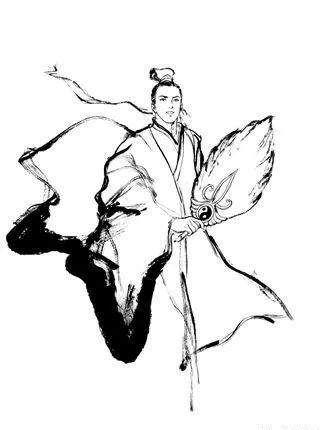However, 1 servant of the guard 2 unremitting 3 in the inner 4, loyal soldier 5 forgotten 6 in the outside, gai 7 chased 8 emperors of the special encounter 9, want to repay his majesty also. It is advisable to open the holy listen 10, to light 11 the first emperor's legacy 12, to honor the spirit of the 13 heroes, not to be vain and thin 14, to quote the unrighteous 15, to plug 16 loyal advice 17 road also.
【Notes】
1 Ran: However, a conjunction that represents a turn.
2 Servants of the Guards: Subordinates who undertake to serve and guard, in this case refers to officials at all levels who undertake internal affairs and affairs.
3 Slack: Slack, slack.
4 Nei: inside the palace, chaonei, here refers to the Shu Han dynasty.
5 Faithful Men: Loyal and aspiring men. This refers to the soldiers who guard the border and go out to fight.
6 Forgetting oneself: Forgetting one's own life means sacrificing oneself.
7 Cover: Override, which here represents a summary induction, similar to "both".
8 Chase: Recall, remember.
9 Special: Special and unusual treatment.
10 Opening of the Holy Hearing: Opening up to expand the hearing of the Holy Ming. Holy Hearing: The hearing of The Holy Ming refers specifically to the emperor's acceptance of opinions and suggestions.
11 Light: Manifestation.
12 Legacy: Virtues that are handed down.
13 Grandeur: vast, carried forward, here to make verbs, to make... Carry forward, vast. Also known as "magnificent".
14 Fěi Thin: Unfoundedly look down on oneself and look down on thin. Delusion: False, without real basis; Fei: Meager.
15 Quoting unrighteousness: Speech is not in line with morality and reason. Quotes: Quotes and parables; Righteousness: Righteousness.
16 Plug: Blocked.
17 Advice: Advice that is loyal and upright.

The previous article analyzed the general trend of the world and the situation of shu han, and in general, it was very unfavorable. But Shu Han is not without a little advantage. At least he had a group of dedicated ministers and soldiers. Everyone in the DPRK is diligent, and the soldiers are not afraid of sacrifice. According to the ancients, the Shu Han dynasty was "renhe". In today's parlance, we can say that Shu Han has the advantage of talent and human resources. From the content point of view, this paragraph is still continuing to analyze the situation, but the author did not flatten it, but used a turning word "ran", that is, "however" to lead it. This kind of writing not only highlights the fact that the ministers of the guards are unremitting inside, and the loyal people forget to be outside, that is, the ministers of the interior are diligent, and the soldiers on the outside are not afraid of sacrifice. At the same time, it also implies the encouragement and vigilance of the later lord Liu Chan. The country is the emperor of your country, the restoration of the Han Dynasty is also your father's last wish, everyone is so dedicated, as the emperor Of Liu Chan, do you still mean not to work hard? If you don't work hard, who else can you afford? Although the author did not say this so bluntly, as long as there was still a little self-consciousness and shame, Liu Chan should be able to see it. Moreover, the following author also clearly pointed out: The reason why everyone wants this is not your prestige and ability of Liu Chan, but because of the reason of the former emperor. Everyone is grateful to the former emperor, to put it more vulgarly, it is for the sake of the former emperor that they did this, so to you Liu Chan.
In the face of such a situation, as long as you do not want to lose the support of the people, do not want to make everyone cold, do not want to be an emperor, and do not want to destroy the country, you should be active and enterprising, and work hard. The author certainly hoped that Liu Chan would do the same. So the words were earnest, the attitude was humble, and the emphasis was long. As long as Liu Chan is willing to work hard, even if he doesn't know what to do, it doesn't matter, the author's words below are very clear, and the sentences are implemented, and the rules can be operated.
In the face of these loyal ministers, it is indeed necessary to speak widely. Let the ministers speak freely. This confrontation shows the virtue passed down by the previous emperors, and the downward pair is an encouragement to people of insight. We all know that for a scholar like Zhuge Liang, who has ideals, pursuits, and integrity, what is valued is often not status and treatment, at least not completely. Displaying their talents and ambitions, ruling the world peacefully, and becoming a saint are their lifelong pursuits. This is inseparable from the long-term indoctrination and edification of traditional Chinese culture. There is an old saying that goes: "If you don't listen, if you don't follow your plans, why stay?" "It means that the suggestions cannot be listened to, the plans are not adopted, and what are they left here for?" This was a common practice among aspiring scholars in ancient China. If you want to keep them and make them really effective, you must protect their enthusiasm, let them speak freely, and let them be full of spirits.
In that era, the emperor was the holder of the highest power, at least nominally. If he does not pay attention to reason, nonsense, reverses black and white, and over-the-tops, then the principled, dignified ministers will be silent and discouraged. After all, perseverance, the number of people who risk death to enter the counsel is still very small. That's why the author says: We should not casually look down on ourselves and use metaphors to violate righteousness, thus blocking the channel of faithful advice.